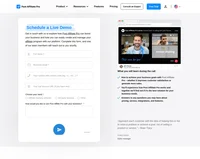What if we told you you could make money at any time, from anywhere — even while you sleep? Sounds too good to be true? Welcome to the world of affiliate marketing. We’ll walk you through everything you need to know to launch your own successful affiliate program.
You’ll learn the basics of affiliate marketing and discover its various benefits. We will provide a step-by-step guide, breaking down the process into manageable tasks, highlighting common challenges and mistakes to avoid, ensuring you start on the right foot. By the end, you’ll be equipped with the knowledge and tools to set up, manage, and optimize an affiliate program that can significantly increase your revenue and broaden your customer base.
Table of Contents
- What is an affiliate program?
- Why you should start an affiliate program
- Starting an affiliate program: a beginner’s step-by-step guide
- Choosing the right beginner-friendly affiliate software
- How to recruit and equip affiliates with winning marketing materials
- Tracking, managing, and measuring your affiliate program
- Common mistakes to avoid in an affiliate program
- Conclusion
What is an affiliate program?
An affiliate program is an arrangement between a company and individuals or other companies, known as affiliates. These affiliates use their influence and online presence to promote the company’s products or services, and in return, they earn a commission for every sale or lead generated through their promotional efforts.
Affiliate programs usually involve three main parties:
- Merchant: This is the company that offers products or services. They are the ones who create the affiliate program.
- Affiliates: These are individuals or companies that promote the merchant’s products or services. They use links or banners to advertise and drive traffic to the merchant’s website.
- Customer: The person who clicks on the affiliate’s link and makes a purchase from the merchant.
The basic mechanics behind an affiliate program are pretty simple:
- Join an affiliate program: An affiliate applies to join a merchant’s affiliate program. Once accepted, they get a unique affiliate link or ID.
- Promotion: The affiliate promotes the products or services using the given link. This can be done through blogs, social media, email marketing, etc.
- Customer clicks: When a customer clicks on the affiliate link, they are redirected to the merchant’s website.
- Tracking: The affiliate link contains tracking information that ensures the affiliate gets credit for the referral.
- Purchase and conversion: If the customer makes a purchase, the merchant tracks the sale and attributes it to the affiliate.
- Commission: The affiliate earns a commission on the sale. This is usually a percentage of the sale price but can also be a flat fee.
These affiliate programs create a win-win situation. Merchants get increased exposure and sales. Affiliates earn money for promoting products they care about.
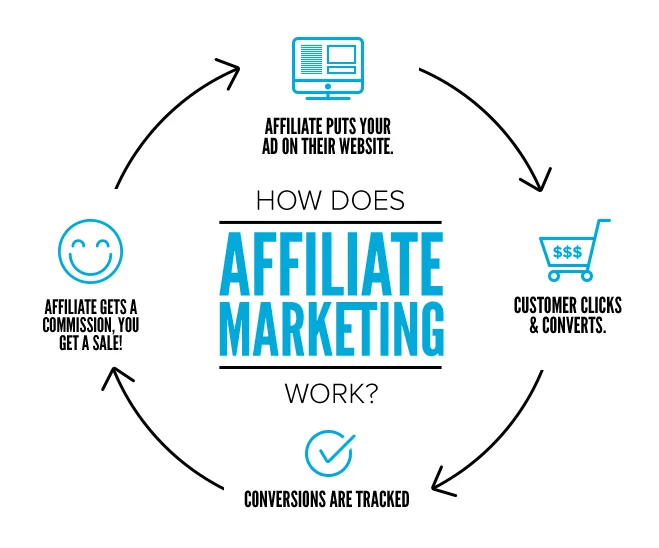
Why you should start an affiliate program
From a business point of view, starting an affiliate program can offer many benefits. So let’s look at some of the main reasons you should consider it:
Amplifying your brand’s reach
By handpicking your affiliates, you can ensure they already have an audience that matches your target market. When these affiliates promote your products, they can capture the attention of thousands of people who trust their recommendations. This trust makes it more likely for these individuals to be interested in your offerings and make a purchase.
According to research, around 52% of marketers believe that affiliate programs bring in high-quality prospects.
Having affiliates that feel passionate about a brand can significantly boost brand awareness across a relevant audience. They also tend to be more convincing and persuasive, making their followers more receptive to your products.
Low risk
Another big advantage of affiliate marketing is its low risk because you only pay the affiliates when they help you make a sale. This performance-based model ensures you get a return on your investment.
This approach can be particularly beneficial for smaller businesses with tight budgets.
You don’t have to worry about losing money on ineffective marketing campaigns. Instead, you can focus on building your brand while your affiliates drive sales and income.
Gaining trust through influential affiliates
Many people search for reviews when considering a new purchase. Influencers and online creators have become some of the most influential reviewers in the digital space. Their opinions matter a lot to their followers.
When reputable affiliates speak positively about your brand, it enhances your reputation. This kind of social proof can be invaluable. Affiliate marketing becomes an excellent way to build credibility and trust with a broader audience.
Cost-effective marketing strategy
While finding the right affiliates requires some initial effort, the long-term benefits can be priceless. With affiliate marketing, you don’t need a dedicated advertising team or to pay for online ads. Instead, your affiliates create engaging content that organically promotes your offerings.
When affiliates understand the benefits, they become more motivated to produce high-quality content. This can lead to increased sales through their affiliate links. By leveraging affiliates, you can create a cost-effective marketing strategy that delivers results.
Scalability and flexibility
You can easily scale up or down without breaking the bank. If you see positive results, you can add more affiliates to expand your reach. Or, you can start focusing on a few top-performing affiliates if that’s more effective.
You also have the freedom to adjust commission and reward structures to match your business growth. As your brand evolves, making your program and commissions more competitive can attract valuable partnerships.
Starting an affiliate program: a beginner’s step-by-step guide
Getting started with an affiliate program involves several steps. Here’s a simple guide to help you get started:
Step 1: Set your goals
Before you dive in, you need to set specific goals. What do you want to achieve with your affiliate program?
Is it more sales, increased brand awareness, or do you want to reach a new audience?
Having clear goals will help you stay focused and measure the effectiveness.
- Think about what type of affiliates can help you reach your goals.
- Set the revenue target you want your affiliates to bring on a monthly, quarterly, or annual basis.
- Think about the number of clicks, impressions, and leads you expect your affiliates to accomplish.
Step 2: Choose products that you will include in the program
The next step is to decide which products or services you want your affiliates to promote. Choose items that are popular and have a good conversion rate. Make sure these products align with what your audience is looking for.
You can also consider offering additional perks that will help attract more traffic and potentially increase sales. These can include:
- Free shipping on orders over a certain amount
- Discounts for first-time customers
- Buy more, save more discounts
Step 3: Set your affiliate pricing and commission
Setting the right commission is important. The commissions need to be attractive to affiliates but also sustainable for your business. Research what competitors are offering to stay competitive. Common commission types include:
- Percentage of sales: Affiliates earn a fixed percentage of each sale.
- Flat rate commission: Affiliates earn a set amount per sale or lead.
Keep in mind that the average commission rate varies depending on the industry. However, to give you a better idea, the most common commission is between 5% and 30%, according to ReferralRock. You can always start with a lower commission rate and go higher if your budget allows you to.
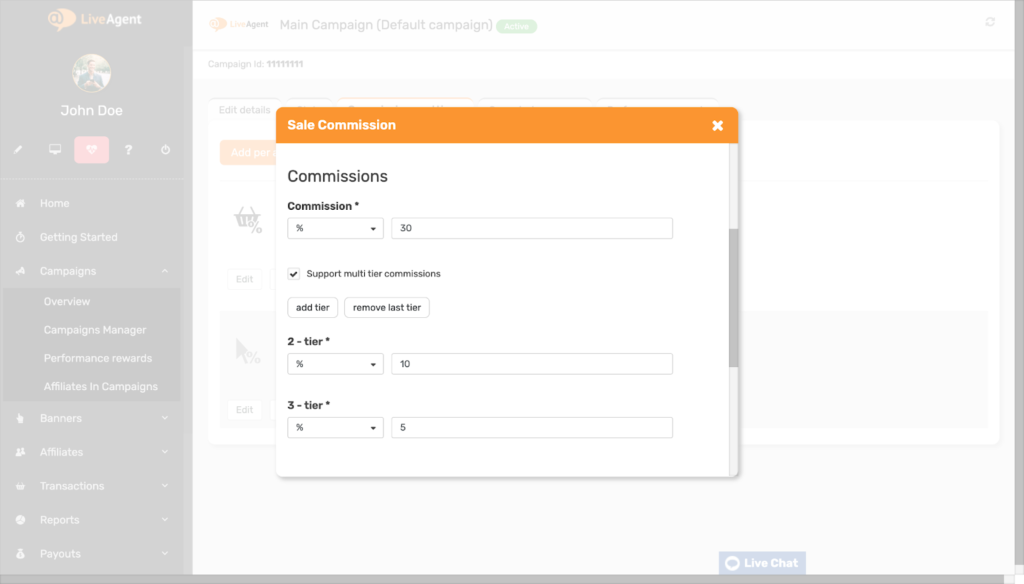
Step 4: Choose an affiliate management solution
If you want to manage everything more efficiently, software like Post Affiliate Pro will be your best friend. It simplifies the entire process.
- It helps you easily track clicks, sales, and conversions in real-time.
- It allows you to access detailed reports to see what’s working and what needs improvement.
- You can create tailored promotional materials like banners or links.
- It offers automatic tracking of updates, conversions, payouts, fraud attempts, link tracking, and more.
Step 5: Create a website/landing page
Build a page where potential affiliates can learn about your program and sign up. A well-designed landing page helps attract high-quality affiliates who are genuinely interested in promoting your products.
An effective landing page should include several key elements:
- Start with a compelling headline that grabs attention and explains what your affiliate program is about.
- Provide detailed information about your program, including commission rates, payment terms, and the benefits of joining. Be transparent about any requirements and expectations.
- Make it easy for interested affiliates to join by including a straightforward sign-up form. Ask for essential information like name, email, and promotional methods.
- You can also include testimonials from current affiliates who have had success with your program. This builds credibility and trust.
- Address common questions in a FAQ section to provide additional clarity and reduce the need for back-and-forth communication.
But how do you get people to visit this page? You can consider using the following strategies:
- SEO: Optimize the landing page for search engines with relevant keywords.
- Social media: Share the link on your social media platforms to reach a broader audience. This way, you will also directly attract people that are already interested in your brand, making them perfect for your affiliate program.
- Email marketing: Send out emails to your existing customers, inviting them to join your affiliate program.
Step 6: Find affiliates
Once everything is set up, it’s time to find affiliates. You can start by promoting your program on your website and social media. Don’t be afraid to reach out to your existing customers who might be interested in becoming affiliates and promoting your brand to others. Another approach could be to attend industry events, join affiliate marketing forums, and network with people.
The key is to make compelling offers, provide bonus incentives, and support your affiliates during the onboarding process.
Discover 10 tips on recruiting affiliates
For more in-depth information on finding affiliates, be sure to check out our article where we give you more useful tips.
Step 7: Manage your affiliates
After finding affiliates for your business, you will need to keep an eye on their performance and communicate with them regularly to build relationships with each of them. You also need to provide them with updated materials to familiarize them with your products and services.
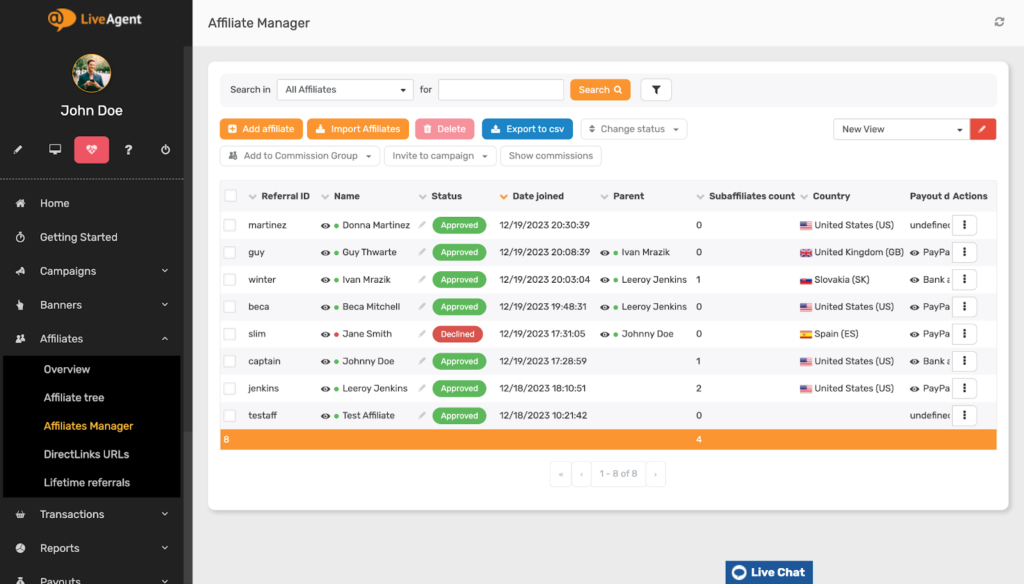
You can also create an accessible knowledge base full of content like video tutorials, product descriptions, pre-written templates and posts, graphics, and webinars to help them align their efforts with your business goals.
Using tools like Post Affiliate Pro can help you with:
- Tracking the performance of each affiliate
- Simplifying the process of adding new affiliates to your program
- Tracking sales per affiliate
- Tracking conversion rates of each affiliate
- Streamlining the process of paying commissions
- Managing custom rewards for performance
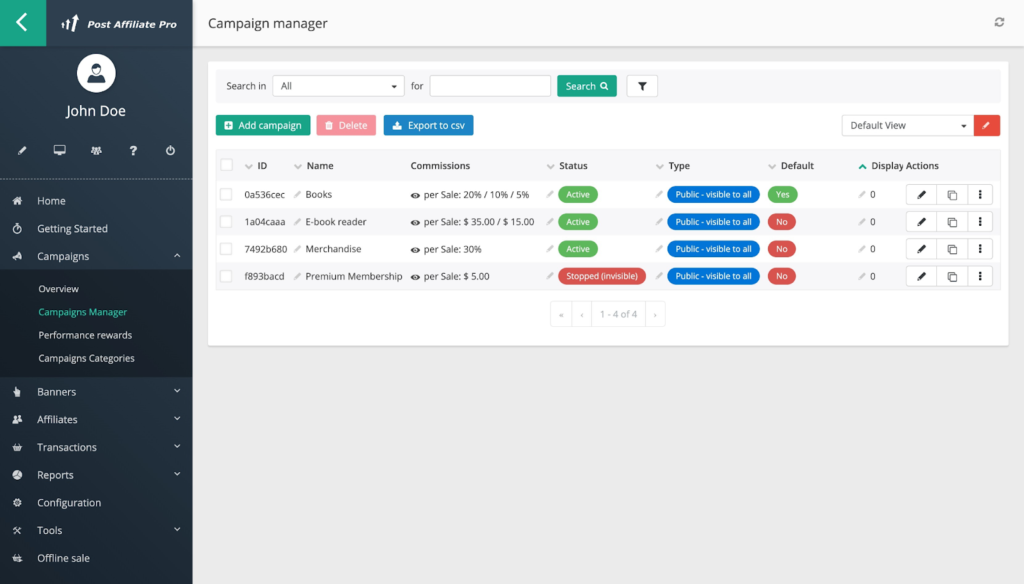
Choosing the right beginner-friendly affiliate software
If you’re a newbie and unsure how to choose the right software for your affiliate program, don’t worry! We’re here to help. We understand that you don’t want to spend time and money on software that won’t meet your needs. So, here are a few tips:
1. Compare features: Do your homework and research different software options to compare their features and see what each of them offers. Some of the key features to consider include:
- User-friendly interface: The software should be easy to navigate and use, even for beginners.
- Tracking capabilities: Ensure the software can accurately track clicks, sales, and conversions.
- Payment management: Automated payment systems can save you a lot of time and reduce errors.
- Customization options: Ability to create tailored campaigns and promotional materials.
- Reporting and analytics: Having access to detailed reports will help you understand what’s working and what needs improvement.
- Customer support: Access to a reliable support team that can help you resolve any issues quickly.
“Post Affiliate Pro is an all-in-one, automated solution that helps us running our affiliate programs. From recruiting and managing affiliates to tracking payments, the tool streamlines the entire process and makes it incredibly easy. I love it!”
– Happy customer review
2. Compare the pricing plans of various software solutions. Make sure you understand what’s included in each plan. Some software may have hidden costs, so read everything carefully. If you are unsure about something, contact their customer support and ask questions.
“When we started looking for an affiliate software, we found out that most providers are charging a percentage of each sale in addition to the monthly subscription fee. As a small business, we didn’t want to pay extra money to a software provider, so we continued searching until we came accross Post Affiliate Pro. It offers a flat monthly fee, so we gave the free trial a chance. Our experience with setting up the software was positive already, but their customer support only amplified that. The quality of the product, combined with the affordable pricing and exceptional service, is the reason we have been a loyal customer for nearly 5 years.”
– Review from happy customer
3. Check out user reviews and ratings. Feedback from other users is the best way to get valuable insights into the software’s performance and reliability. Do others find it user-friendly? What do they think about the features? Are there any technical issues that occur regularly? Pay attention to all these things while reading the reviews.
“Post Affiliate Pro is a very intuitive tool. I’ve been using it for two months, and I have to say that their customer support is the best I’ve experienced so far. The tool offers many features, which makes it very reliable and scalable. It also supports customization that allows you to create and grow your unique affiliate campaigns.”
– Review from a satisfied customer
4. Take advantage of free trials and demos. This allows you to test the software firsthand and see if it’s a good fit for your needs. Do you find the interface easy to navigate? Does it offer the tracking and reporting tools that you need? Is the customer support helpful during this period? This hands-on experience helps ensure you make an informed decision before spending money and committing to something.

How to recruit and equip affiliates with winning marketing materials
Now, let’s talk strategies! The following strategies can help you recruit your affiliates and equip them with the right marketing materials to boost the success of your affiliate program.
Convert your loyal customers into affiliates:
Satisfied customers are often your best advocates. Statistics show that loyal customers who have an emotional connection with a brand are 71% more likely to recommend that brand to others.
Use this to your advantage and reach out to them, offering them the opportunity to join your affiliate program. You can encourage them to share their reasons for buying from you and what they like about your brand. Happy customers are more likely to be persuasive and genuine in their promotions.
Join an affiliate network:
What are affiliate networks, you may ask? Affiliate networks are platforms that connect merchants with potential affiliates. By signing up, your brand gets listed in their directory, making it easier for affiliates to discover your brand and join your program.
Approach social media influencers and bloggers:
Social media content creators usually have a highly engaged audience. Find the ones that talk about topics related to your niche and approach them with an offering. It may be a good idea to send them a free product or sample to let them test the products and see if they like it. If they find your products interesting, they can create content that features your products and share their affiliate links with their followers.
This can help you reach a larger and more targeted audience. In fact, 88% of consumers said an influencer’s recommendation motivates them to make a purchase, only highlighting the growing influence of content creators on consumer decisions.
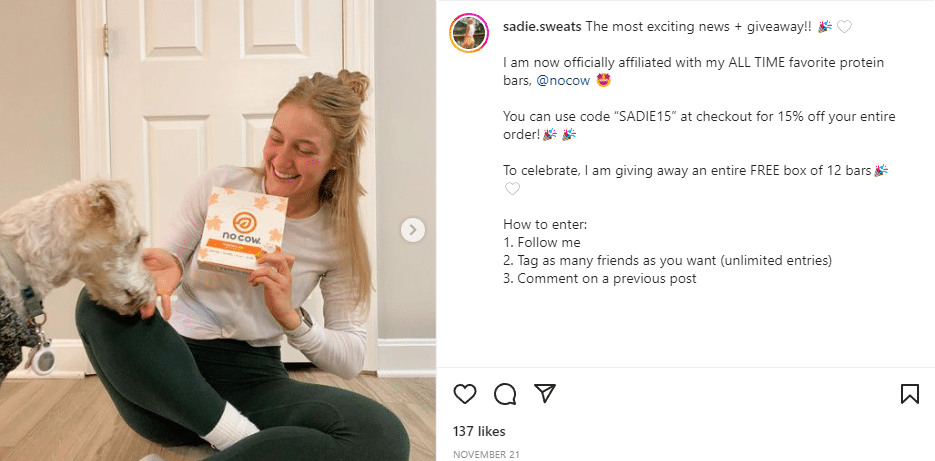
Join communities and forums relevant to your niche:
There are many online communities and forums where people discuss a wide range of topics. Look for relevant Facebook groups, subreddits, and other forums that relate to your niche. Before promoting your affiliate program, make sure it’s allowed within the group’s rules. If permitted, share information about your program and invite members to join.

Run ads on search engines and social media platforms:
Another option is to invest in paid advertising to help you reach potential affiliate marketers. Placing targeted ads on search engines like Google or social media platforms like Facebook and Instagram can help you reach individuals who are interested in affiliate marketing or related topics.
Once you have recruited your affiliates, make sure they have access to high-quality marketing materials. The more resources you provide, the easier it will be for affiliates to effectively promote your products. But remember to maintain brand consistency in all your materials by using your brand colors, fonts, and tone of voice.
Here are the main types of materials you should provide them with:
1. Banners and display ads are visual tools that affiliates can place on their websites, blogs, or social media. They should encourage users to click through to your site.
- Create eye-catching design and use high-quality images
- Make sure the message or offer is clear
- Include a CTA, such as “Shop Now” or “Learn More”
- Create banners in various standard sizes to fit different placements
2. Email templates: Affiliates often use email marketing to reach their audience. Providing ready-to-use templates can save them time and ensure consistent messaging.
- Leave space for the affiliate to add personal touches or customize the message
- Write attention-grabbing subject lines to increase open rates
- Make sure the CTA is prominent and easy to find within the email.
- Use images and graphics to break up text and make it visually appealing
3. Providing high-quality product images is vital for creating visually appealing content about your products.
- Create images from different angles to give a comprehensive view of the product
- Include lifestyle shots showing the product in use to make it more relatable
4. Videos are engaging and easily shareable. Affiliates can use product demo videos, unboxing videos, or reviews.
- Keep videos short and informative, focusing on key features and benefits.
- Ensure good lighting, clear audio, and professional editing.
Tracking, managing, and measuring your affiliate program
To fully understand how well your affiliate program is performing, which affiliates are the most successful, which products are the most popular, and what needs to be improved, you need to track everything. Measuring success allows you to optimize your strategies and increase your program’s overall effectiveness.
And if you want to maintain good relationships with your affiliates, you need to manage them and ensure they remain motivated and productive.
But you can’t do all this by yourself! You need to look for tools that can make your life easier. Post Affiliate Pro offers powerful features that can accurately monitor every click, sale, and lead generated by your affiliates and make it easy for you to manage their commissions. These features include:
- Direct links tracking
- Custom affiliate tracking codes
- Referral tracking by IP
- Affiliate coupon tracking
- Multi-tier commissions
- Recurring commissions
- Lifetime commissions
These metrics will be your best friends for measuring the success of your affiliate program:
- Conversion rates indicate how effectively affiliates are turning clicks into sales.
- Average order value shows the average amount spent per purchase, helping you understand customer behavior.
- ROI (return on investment) measures the profitability of your affiliate program by comparing the revenue generated to the costs involved.
- Click-through rate (CTR) measures the percentage of clicks on your affiliate links compared to the number of times the link was viewed.
- Earnings per click (EPC) calculates the average earnings generated each time someone clicks on an affiliate link.
- Number of active affiliates shows you how many affiliates are regularly promoting and generating conversions.
- Affiliate engagement tracks the level of activity from your affiliates, including login frequency and participation in promotional efforts.
Post Affiliate Pro provides comprehensive analytics and reporting features to help you analyze these metrics and optimize your affiliate program for maximum success.
- Online users report shows who is logged into your Post Affiliate Pro account in real-time. It provides details like their username, name, role, last login time, and IP address.
- Top affiliates report shows which affiliates are performing the best in your program. It helps you see which affiliates are getting the most conversions on your website.
- Trends report shows your transactions in charts and data fields. This helps you see the direction your affiliate program is going. You can filter transactions by date, status, campaign, or affiliate.
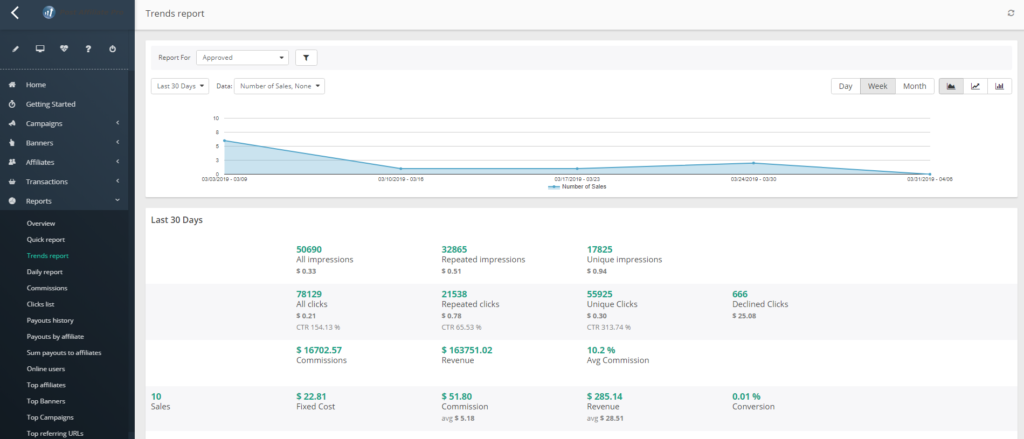
- Top URLs report provides important information about how users interact with affiliate links. It helps businesses improve their marketing strategies. The report shows which marketing channels and content bring in traffic and sales.

Common mistakes to avoid in an affiliate program
Unclear commission rules
If your affiliates do not understand how they are compensated, it can lead to confusion and disagreements. Clearly state the commission rate and let them know that this rate can change. You may want to increase or decrease it based on the affiliate program’s performance, changing production costs, or other circumstances. Also, inform your affiliates that product and service prices may vary. These changes will, in turn, affect their commissions.
Provide detailed information on when and how commissions are paid out. Specify the payment methods you will use and how often affiliates can expect to get paid. Clear communication on commission rules can help prevent misunderstandings, build trust and long-term relationships with your affiliates.
Choosing the wrong products to promote
The best products are those that are desirable to customers and have a high level of quality. If you choose wrong products, it can have several negative consequences. For example, low-quality products can lead to dissatisfied customers, which reflects poorly on your affiliates and your business. This can result in a loss of trust and damage your reputation.
Another important thing is to ensure the products align with your affiliate’s niche. This is important because affiliates have specific audiences who trust their recommendations. If the products do not match their niche, the promotions can seem inauthentic. Promoting relevant and high-quality products can help maintain trust and increase conversion rates, benefiting both your brand and your affiliates.
Not using reliable affiliate and tracking software
Make sure the software you choose has all the features you need to monitor key metrics, assess performance, and make data-driven decisions for improvements.
Look for scalable software that can grow with your business. This way, as your affiliate program expands, the software can handle the increased activity without any hiccups. Always take advantage of free trials and read reviews from other users to get a sense of the software’s reliability and effectiveness.
Consider your budget when choosing software. Some solutions might look appealing but could be too expensive. And lastly, make sure the software provider offers great customer support. You’ll want a team that can help you quickly when you run into issues or have questions. Post Affiliate Pro offers excellent technical support. For example, if a merchant faces an issue with DirectLinks on the affiliate’s page, the support team is ready to help. They will investigate the problem and suggest solutions to fix it.
Failing to provide support and training to your affiliates
If you do not train your affiliates properly, they may struggle to promote your products, leading to poor performance, fewer sales, and, ultimately, a less successful affiliate program. On the other hand, well-trained affiliates understand your products, your brand, and the best marketing practices, making them more effective in promoting your offerings. Providing regular support is also essential. Make sure your affiliates know they can reach out to you with questions or concerns.
The training should include several key elements:
- Product knowledge: Ensure affiliates are familiar with the features, benefits, and unique selling points of your products.
- Marketing techniques: Teach your affiliates effective marketing strategies, such as SEO, social media marketing, and content creation.
- Tools and resources: Provide necessary promotional materials like banners, text links, and detailed product descriptions. Explain how to use these materials effectively when promoting your products.
Conclusion
Let’s recap everything. We started with the definition of an affiliate program and its key benefits to show you why it may be worth considering. With the potential to increase your revenue and broaden your customer base, affiliate marketing can be a game-changer for your brand. To help you get started, we walked through the process of setting up an affiliate program step-by-step, showing you that it’s not as daunting as it may initially seem.
Next, we highlighted the importance of choosing the right affiliate software and how it can help with tracking and managing performance to ensure your program runs smoothly. By following a few simple tips, you will know what to look for when selecting the best software for your needs. Recruiting affiliates is another crucial part. Without affiliates, there’s no affiliate marketing. By following our strategies, you’ll be able to build a team that fits the needs and niche of your brand. We also touched on common challenges and mistakes, helping you avoid pitfalls along the way.
Now, you are equipped with everything necessary to start your affiliate marketing journey. To make your entry even smoother, consider Post Affiliate Pro. With features designed to simplify and optimize your affiliate program and a 30-day free trial, it’s a great starting point for anyone new to affiliate marketing. Sign up today and start boosting your brand with the power of affiliate marketing!
Discover the essential role of affiliate software in managing and optimizing your affiliate marketing programs. Learn how it streamlines link tracking, referral management, and commission payments, ensuring data security and fraud prevention. Unlock growth opportunities with efficient program management and boost your business's reach and ROI. Visit now to explore the benefits of investing in affiliate software!
How To Find Affiliates to Sell Your Products
Discover over 10 successful strategies for finding high-quality affiliates in 2024 to boost your product sales. Learn to leverage influencers, join affiliate networks, and enhance your reach through SEO and social media. Maximize revenue with transparency and ongoing monitoring in your affiliate marketing program.
The leader in Affiliate software
Post Affiliate Pro offers a comprehensive affiliate software platform to manage multiple affiliate programs with ease. Enjoy no setup fees, 24/7 customer support, and a free 1-month trial. Ideal for small and large businesses, it features precise tracking, automated workflows, and customizable tools to boost your affiliate marketing success. Try it now and streamline your affiliate operations effortlessly!
The Ultimate List Of Affiliate Programs – Part 1/2
Discover the ultimate list of top affiliate programs to boost your income effortlessly. Whether you're a blogger or a website owner, explore diverse options and find the perfect match for your niche. Start your affiliate journey with our comprehensive guide!
Affiliate networks vs. affiliate tracking software
Explore the key differences between affiliate networks and affiliate tracking software to streamline your affiliate marketing operations. Discover which solution offers the best automation, control, and efficiency for your program. Make an informed choice to optimize your revenue strategy.





